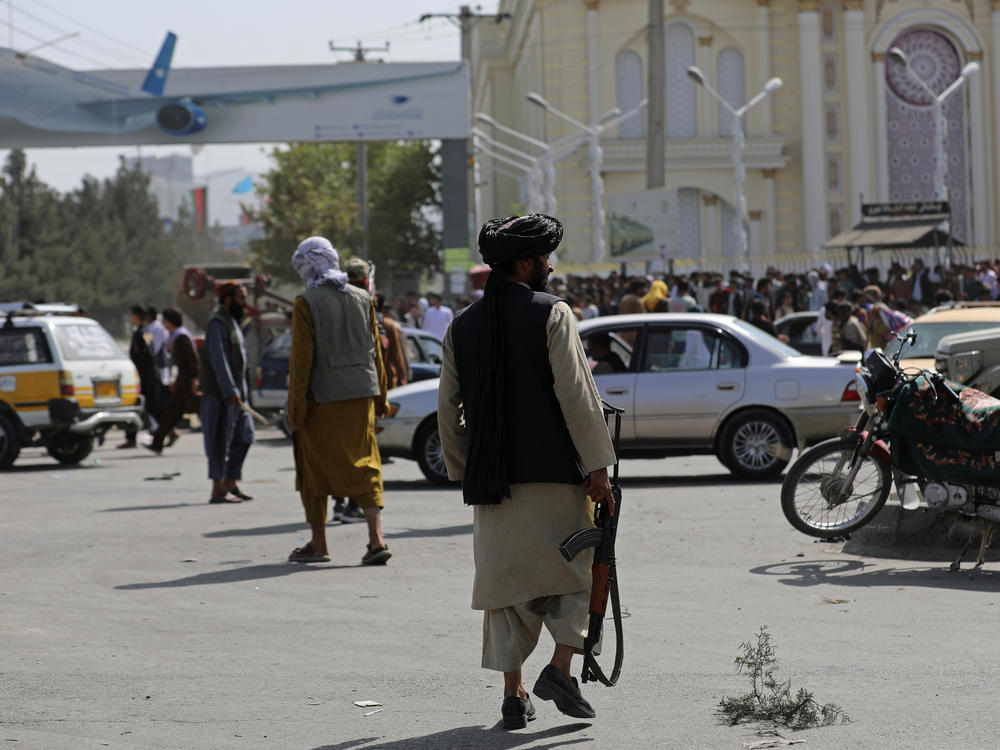Section Branding
Header Content
An Ex-Senior Afghan Official Is Hiding From The Taliban, And Growing Angry At America
Primary Content
"I am not safe," reads a cellphone text to NPR from a former Afghan government official. "I don't know what will happen with me."
They requested not to publish their identity or location for their safety. They have heard the Taliban assigned a hit squad to find them, following previous death threats.
This former high-ranking national government official is one of many who have gone into hiding or exile amid the chaos since Afghanistan fell to the Taliban, as the United States and international allies end their two-decade campaign to help fight the insurgent group. Among them was Afghan President Ashraf Ghani, who quietly slipped out of the country on Sunday. Now, expecting the Taliban will restore their brutal form of Islamist rule, people who worked in Afghanistan's Western-backed government fear for their lives.
This former official says they don't make frequent phone calls to family or anyone else to avoid detection, but they agreed to speak by phone with NPR to describe the situation in Afghanistan as the Taliban retook control. They said militants are patrolling neighborhoods in Afghan cities and even going door to door hunting for government loyalists in some places. In the city where this ex-official is holed up, there is occasional gunfire in the streets.
"I plan to hide myself, step by step," they said. "I change my plan every day."
Afghan security vanished
To the world, it seemed as if the entire Afghan government evaporated as the Taliban entered Kabul. The official confirmed it appeared that way on the inside too — punctuated by Ghani's departure.
They chuckle sadly when asked if there was any protection from members of the Afghan armed forces or police, which received two decades of international aid and training. "No army," they say. "No police. There is nothing. The situation is getting worse day by day."
They don't blame Ghani for escaping. Otherwise, the Taliban would have forced the president to resign to pave the way for the group to assume control, the source said. They believe that would have been far more damaging to Afghanistan and more beneficial to the Taliban than Ghani seeking refuge abroad.
On U.S. responsibility
But this former official does point a finger of blame at the United States, saying if American forces had warned the Taliban not to come into Kabul, the militants would have stayed out. Since that didn't happen, Afghans including this source are now "becoming more and more angry" at what has developed and hold the U.S. responsible, they said.
Taliban officials promised a peaceful transfer of power and that "there will be no revenge" on the Afghan people. But the former official rejected the claims, pointing to videos circulating on social media of bodies in the streets of Afghan cities of Kandahar and Ghazni after the Taliban took over.
The source also dismissed the militants' promise that schools will reopen and girls will be welcome. "They do not have any capacity [to run a country]," they said. "They do not have their own rules without violence, without killing and threatening people."
And this former official says there's no question patriots like them, who want a country based on a constitution and rule of law, will remain at the top of the Taliban's target list, becoming even more vulnerable once the last international evacuation flights take off in the coming days.
This former official is also looking to get out of Afghanistan, at least temporarily, seeking a visa and safe passage to any European country.
However, they say after what happened in recent weeks, they'd rather die under siege in Afghanistan than consider moving to the United States. "I don't want help from America," they say.
Copyright 2021 NPR. To see more, visit https://www.npr.org.

